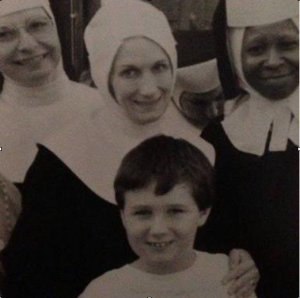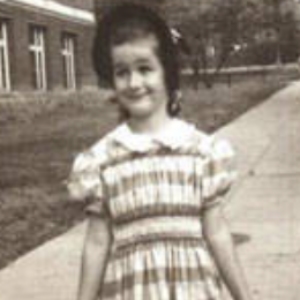
“I wasn’t getting the kind of parts I wanted. I’m not a homeless person or an alcoholic; why do I have to keep playing these parts? I wanted to play people I admired,” protested TV, film and stage veteran Prudence Wright Holmes.
Not that the character of a homeless person or an alcoholic mightn’t be immensely admirable but Holmes wanted to portray personages like Harper Lee, Willa Cather, and Miep Gies who – at dire risk to her own life – helped hide Anne Frank and her family from the Nazis in an annex for two years. When you have talent, creativity, and determination like Holmes, you make wishes a reality.
The marvelous, character-filled face of Prudence did appear as a homeless woman in a recurring role on the soap opera Another World in the 1990s. She played an alcoholic in God’s Pocket with Phillip Seymour Hoffman – one of his last movies – though she is probably more memorable as one of the nuns in the Sister Act movies, where her oddly

soprano singing voice came into play. Only three years older than actor Randy Quaid, her mesmerizing looks got her cast as his mother in the 1996 comedy Kingpin. Her on-screen credits go all the way back to an episode of Charlie’s Angels in 1978, the same year she appeared as a character named Sexless in the TV movie Li’l Abner in the Dogpatch Today. (It may be hard to relate to the fortitude for the craft and career of an actress that motivates her to allow herself to play a character billed as “Sexless” – but that’s Holmes.) She did an episode of Boardwalk Empire in 2010 and she recalls, without a whimper, laughing with blood coming out of her mouth, as the Demon Old Lady who preys on the vulnerable children of a housing project in the “Little Monsters” installment of the CW’s Two Sentence Horror Stories anthology TV series. That segment premiered in 2019; “Disgusting makeup,” she says, “including glued on dirty fake nails that were hard to remove.”
Prudence was named after one of her forebearers, Prudence Cummings Wright, who led a militia of women that saved the town of Pepperell, Massachusetts in the Revolutionary War. Holmes’ father was Burton Holmes, a former Navy commander turned insurance agent. Her mom, Marjorie Holmes, was a direct descendant of Prue Cummings – her great, great, great granddaughter. Prudence says she had always imagined Pepperell as a quaint, charming setting in which her ancestor was publicly honored for her heroics; so Holmes and her mother set out, about 20 years ago, to document the town’s memorialization of their ancestor. Where they expected a statue, there was none. The site was, “actually a glorified trailer park filled with Vietnamese immigrants.” The pair found a man in a 7-11 store who spoke English and directed them to a vacant lot. There, they climbed over discarded tires and broken bottles and, “finally found this tiny plaque underneath some leaves with [Prue’s] name on it and birth and death dates.” Prudence vividly relates, “My mother started laughing so hard she wet her pants,” and ended up collapsing on the ground in irony. In aiding her spent mother, Prudence joined her on the ground. They later found out the whole lot was covered in poison ivy; both women came down with, “horrible cases,” of poison ivy rash.
She does not remember the exact age she was when she dragged her mother to court, but she knows she was under 10 years old when she orchestrated the legal change of her name to “Tina.”
Prudence was born in Boston and grew up in Bexley, Ohio where the family moved when her father got a job there. In Ohio, her heroic namesake’s existence was unknown – even worse than the obscurification in Massachusetts – and she says she was endlessly teased about her uncommon moniker. Enthralled by Tina the Ballerina – the children’s story of an intrepid child-ballet dancer that enchanted countless young girls in an audio recorded version – Prudence began to obsess on the radiant

spirit of the little dancer and the lyrical sound of her name. In second grade she announced, “If anyone calls me Prudence I’m not going to answer. I’m Tina,” and, a few years later, insisted on official procedures for a legal name change. When Tina Holmes began her career as an actor, her agent told her it would be in her best interest to switch the name back because “Prudence” is, “more memorable.”
She has had one marriage, which ended in divorce, and is the mother of one son whom Prudence says, “is married to a really nice woman.”
Of her father she claims, “He didn’t like anybody except white, Anglo-Saxon protestants,” so growing up with him, “as a hippie radical in a very conservative town,” was a constant maelstrom. That later provided rich content for the first play she penned, Bexley, OH. The showcase is a completely autobiographical, one-woman stage play which centers around Prudence’s early years of maneuvering through her contentious, awkward upbringing and her father’s absurd fixation on the Dr. Sam Sheppard murder case that dragged on through the 1950s and ‘60s. Of Prudence and the play, the NY Post said, “A clever narrator makes her childhood memories a grotesquely funny portrait of a society in decay…” and the Associated Press praised the playwright/actor saying, “…her understated performance is the play’s secret weapon…she is clearly a performer to watch…”
First performed at the New York Theatre Workshop in 2003, the success of Bexley, OH was the beginning of Prudence’s dream coming true of creating the kind of parts she longed to play. She wrote the interactive murder mystery Agatha Is Missing in which, as ace detective Miss Marbles (get it?), Holmes interrogates the audience to get to the bottom of the real-life disappearance of Agatha Christie in 1926. That tour de force enjoyed a sold-out run at the Edinburgh Fringe Festival in 2018 and was repeated the next year. She would have made a third run in Edinburgh in 2020 had it not been for the Coronavirus pandemic. In Secrets of a Mockingbird, another of her solo shows which she has played widely on the east coast, Prudence portrays novelist Harper Lee. She penned the solo study, Willa Cather: Her Life and Loves, of the complicated novelist who challenged conventions of gender and other societal roles; that work has garnered Holmes high praise in academic and arts-and-letters circles. Hiding Anne Frank, about little-known Holocaust hero Miep Gies, is Holmes’ latest solo stage production to date.
Others of the playwright’s works comprise small casts such as the based-on-true-life dramas Sister Girl about a college-educated freed slave who goes undercover in the Civil War and Beatchick about an aspiring Beat-generation poet. Her comedy Leave the Drama on Fire Island calls for three women and a man. She has some other great ideas in the pipeline, like a script about her father’s surprising second marriage to, “an Anna Nicole Smith-type,” and she has begun work on a portrayal of the infamous, misunderstood, and ill-treated Typhoid Mary.

Holmes has also had supporting roles on Broadway, appearing in productions including Inherit the Wind with the late George C. Scott, Lettice and Lovage with the indomitable Maggie Smith, and Happy Ending with Meryl Streep. All this stage acting and writing certainly familiarizes Holmes with the art of the monologue and she has earned the honorific, The Monologue Detective. “I have helped thousands of actors succeed at auditions for over 30 years,” she says at her website. The monologue coaching began, “in a workshop where you audition for casting directors,” Prudence explains. “I was just noticing that people did monologues that made them look like they didn’t know how to act because they were using the wrong monologues.” The first example that really struck her was an offering from a young model and aspiring actor who performed a monologue, “from a play called The Woolgatherers about a girl who couldn’t get a date.” But the model was, “drop-dead gorgeous. So, I suggested to her a different monologue about a beauty pageant winner.” It wasn’t from a play at all but from American Dreams, a book of interviews by non-fiction writer Studs Terkel. “She did it and it was like a miracle happened.” That is how her coaching practice began though, of course, the COVID crisis slowed her business way down.
On films, “I think that casting is really a very important part of the success of a movie,” Prudence says. When speaking of the famed Coen brothers and her turn in their 2018 film The Ballad of Buster Scruggs she tells the story of tracking them down and showing up at their office in Hollywood a few decades back. She says she knocked on the door and handed Ethan Coen her picture and resume, telling him she would like to be in one of their movies. Eventually, it happened. Prudence is full of

praise for the screenwriting/directing duo, lauding their gift for constructive organization and their keen sense of trusting the actors they cast. “When I got to the set, they really didn’t give me any direction – except to say one line louder because I was speaking to a deaf person. That’s it.” She was also thrilled that not one moment of her performance ended up, as is commonly expressed, on the cutting room floor.
As one would expect, through the course of her long career, Holmes has been accustomed to working with mostly white male crews. That is why she felt so refreshed when working on both Two Sentence Horror Stories and her 2018 experience on the Netflix series Orange Is the New Black, the crime drama/comedy set in a prison. Holmes was impressed with the artistic voice of …Horror Stories’ young African-American director Tyarisha Poe and felt the two, “hit it off. We were joking around and the whole crew was so young it was like being in college. None of those old grizzled men, you know,” she laughs. She says the crew of …Orange… was all female. “It was such a big difference. They were so nurturing like, ‘Do you want some hot tea?’ Was I too cold? Was the room comfortable? It was very different.”
Prudence has seen good times and bad and she’s seen a lot of change. “What I really liked,” about working on Orange Is the New Black, “was the regular extras.” She emphasized that the production company made a point of hiring senior performers to play some of the inmates. “I mean really senior,” she says. “Some of them were on walkers – but they had jobs. They were just like any other actors,” she rejoiced, adding, “They just keep on going.”
Just like Tina Holmes, never suppressed, just keeps on going.
All photos courtesy of Prudence Wright Holmes
<- Return to search